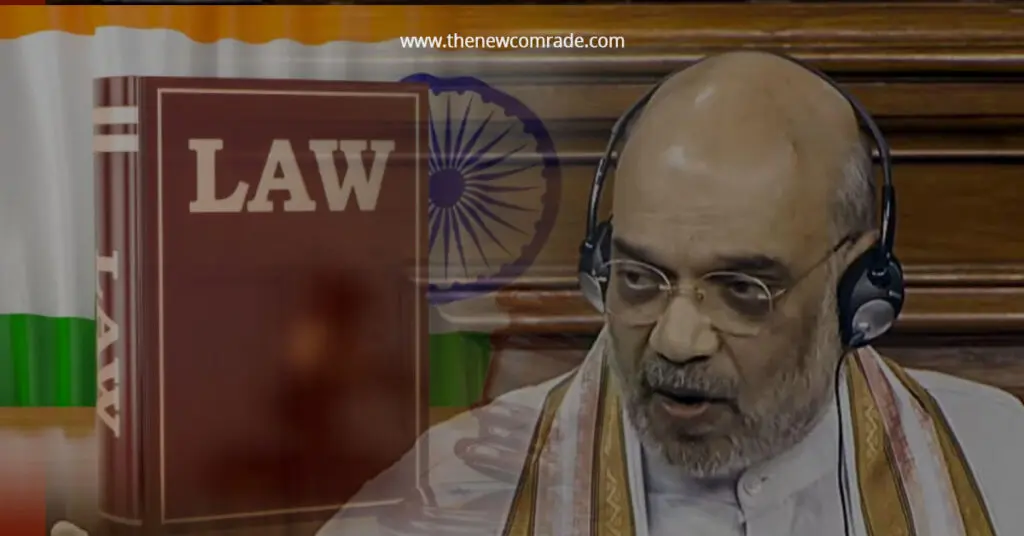India’s legal landscape is currently abuzz with the reverberations of change, spearheaded by Union Minister Amit Shah. Three bills, poised to revamp the archaic Indian Penal Code (IPC), Criminal Procedure Code (CrPC), and Indian Evidence Act (IEA), have taken center stage, promising a ‘recalibration of our justice system.’
The government claimed that the IPC and CrPC adopted in the colonial period contained provisions that were out of touch with present-day sensibilities and emerging contours of criminal justice. Building upon recommendations furnished by multiple committees and Law Commission reports, a panel chaired by the vice-chancellor of the esteemed National Law University was tasked with the conceptualization of the new codes in 2019.
Central to this transformation is the proposed enactment of the Bharatiya Nagarik Suraksha Sanhita (BNSS), poised to replace the extant Code of Criminal Procedure. At the heart of this alteration lies the provision for “trial in absentia,” a departure from the earlier CrPC which upheld the accused’s right to participate fully in their trial. This new legislation empowers the court to proceed with the trial and potential conviction of an absent accused, provided that a specific time period has elapsed since the framing of charges. Professor Akshay Pandey, a criminal law expert at the National Law University, Lucknow has stated that ‘ convicting an accused in absentia is fine if the objective is to provide closure to the victim’ however he expressed concerns that this might inadvertently compromise an accused individual’s right to a just trial. Some also analyze that the BNSS is a massive leap from the earlier system as it facilitates greater use and acceptance of technology, digital devices, and communications technology in the criminal justice system.
Simultaneously, the Bharatiya Nyaya Sanhita (BNS) was introduced as a revamped IPC which includes the “historic decision” to repeal the sedition law (IPC Section 124A). For decades, successive governments have used India’s colonial-era draconian sedition law against students, journalists, intellectuals, social activists, and those critical of authority. Experts point out how the new code under section 150, includes a provision within the ‘offenses against the state’. Even though it refrains from using the word sedition its definition parallels the established provisions of sedition outlined in Section 124A of the Indian Penal Code(IPC). This distinctly addresses the imposition of punishment from seven years to life for ‘acts that endanger the sovereignty, unity, and integrity of India.’ It even expanded the definition of the offense to include electronic communications and the use of financial means. In other words, the spirit of sedition as an essence is retained, sustained, and strengthened with ambiguous terms in the new legislation.
Experts point out that there is a general lack of clarity in these proposals with some even appearing vague. The new legislation brings offenses like terrorism, corruption, mob lynching, and organized crime under conventional penal laws. This is in contrast to how it is considered as special laws now. Furthermore, even though the government claims that reformation of the criminal justice system is an attempt to ‘decolonize’, these bills retain more the 80% of the 160-year-old Indian Penal Code drawn by the British under new names. One could observe the definitions of these bills have been expanded, particularly what is meant by a terrorist act. In the new law it is regarded as intentional engagement “in an action to threaten the unity, integrity and security of India” by among other ways, ‘intimidating the government’ and ‘compelling government actions’. The law has been expanded to cover overseas individuals, entities, and acts. These vague provisions also perpetuate the police powers in constitutionally unacceptable powers, granting them unreasonably broad powers of arrest.
A plot of selective and exclusive usage of higher punishments can be observed in provisions regarding Mob lynching (now introduced as a specific offense) and similar crimes against Muslims. However, these proposals seem fuzzy and irrationally framed without considering the social and political factors that may impact these cases. There is also a concerted emphasis on addressing crimes against women and children, along with an expanded definition of sexual assault provisions. It seems like a desperate effort to take immediate heat off the Modi Government over the Manipur crisis. Skeptics speculate that this realignment might serve as a strategic smokescreen, to pre-emptively shield the Modi Government from opposition onslaughts.
The nomenclature attached to these bills has sparked another polarizing discourse, invoking questions of linguistic imposition. Tamil Nadu CM MK Stalin slammed the naming of the bills as an ‘audacious bid’ to tamper with India’s diversity through a sweeping overhaul that ‘reeks of linguistic imperialism.’ Article 348 (b) states that all Bills or amendments to be moved in either House of Parliament or state legislature, all acts passed by a parliament or state legislatures, ordinances passed by the President or state governors, and all orders, rules, regulations, and bye-laws issued under the Constitution or any law made by Parliament or the Legislature of a State, shall be in the English language. Senior advocate in Delhi court Sanjay Gosh commented that this was a move ‘unheard of’ and needs to be seen in the light of a very Brahmanical Hindi imposition.








